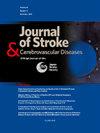Investigating causal associations of gut microbiota and blood metabolites on stroke and its subtypes: A Mendelian randomization study
IF 2
4区 医学
Q3 NEUROSCIENCES
Journal of Stroke & Cerebrovascular Diseases
Pub Date : 2025-01-09
DOI:10.1016/j.jstrokecerebrovasdis.2025.108233
引用次数: 0
Abstract
Background
The causal relationships between gut microbiota, blood metabolites, and stroke and its subtypes remain unclear. This study aims to uncover the causal associations using Mendelian randomization.
Methods
We initially identify Single-Nucleotide Polymorphisms (SNPs) correlated with gut microbiota and blood metabolites as instrumental variables (IVs) from the summary statistics in Genome-Wide Association Study (GWAS) to evaluate their potential causal associations with stroke and its subtypes. We proceed with a two-step Mendelian randomization analysis aiming to determine whether blood metabolites mediate the relationships between gut microbiota and stroke or its subtypes.
Results
We identified the genetic predictions of 12, 11, and 10 particular gut microbiota were associated with stroke, ischemic stroke, and intracerebral hemorrhage respectively. Inverse variance weighted (IVW) analysis disclosed Alistipes (OR [95%CI]: 1.11[1.00,1.23]), Streptococcus (OR [95%CI]: 1.17[1.05,1.30]), and Porphyromonadaceae (OR [95%CI]: 2.41[1.09,5.31]) as the primary causal effects on stroke, ischemic stroke, and ICH, respectively. We determined that 8, 11, and 1 blood metabolites were causally related to stroke, ischemic stroke, and ICH, respectively. Among these metabolites, Citrate (OR [95%CI]: 2.39[1.32,4.34]) and Beta-hydroxyisovalerate (OR [95%CI]: 2.54[1.62,3.97]) had the foremost causal effect on stroke and ischemic stroke, respectively, whereas Glutaroyl carnitine evidenced a causal effect on ICH. Furthermore, our study revealed that Tetradecanedioate marginally mediated the causal effects of Paraprevotella on stroke and ischemic stroke.
Conclusions
This study established a causal link between gut microbiota, plasma metabolites, and stroke. It revealed a marginal pathway, shedding new light on the intricate interactions among gut microbes, blood metabolites, stroke, and their underlying mechanisms.
研究肠道微生物群和血液代谢物与中风及其亚型的因果关系:一项孟德尔随机研究。
背景:肠道微生物群、血液代谢物与中风及其亚型之间的因果关系尚不清楚。本研究旨在揭示孟德尔随机化的因果关系。方法:我们首先从全基因组关联研究(GWAS)的汇总统计数据中确定与肠道微生物群和血液代谢物相关的单核苷酸多态性(snp)作为工具变量(IVs),以评估它们与中风及其亚型的潜在因果关系。我们进行了两步孟德尔随机化分析,旨在确定血液代谢物是否介导肠道微生物群与中风或其亚型之间的关系。结果:我们分别确定了与中风、缺血性中风和脑出血相关的12、11和10种特定肠道微生物群的遗传预测。逆方差加权(IVW)分析显示,Alistipes (OR [95%CI]: 1.11[1.00,1.23])、Streptococcus (OR [95%CI]: 1.17[1.05,1.30])和Porphyromonadaceae (OR [95%CI]: 2.41[1.09,5.31])分别是脑卒中、缺血性卒中和脑出血的主要致病因素。我们确定8、11和1种血液代谢物分别与中风、缺血性中风和脑出血有因果关系。在这些代谢物中,柠檬酸盐(OR [95%CI]: 2.39[1.32,4.34])和β -羟基异戊酸盐(OR [95%CI]: 2.54[1.62,3.97])分别对中风和缺血性中风有最重要的因果影响,而戊二酰肉碱对脑出血有最重要的因果影响。此外,我们的研究表明,四戊二酸在Paraprevotella对脑卒中和缺血性脑卒中的因果效应中起到了微弱的介导作用。结论:本研究建立了肠道菌群、血浆代谢物和中风之间的因果关系。它揭示了一个边缘途径,为肠道微生物、血液代谢物、中风及其潜在机制之间复杂的相互作用提供了新的线索。
本文章由计算机程序翻译,如有差异,请以英文原文为准。
求助全文
约1分钟内获得全文
求助全文
来源期刊

Journal of Stroke & Cerebrovascular Diseases
Medicine-Surgery
CiteScore
5.00
自引率
4.00%
发文量
583
审稿时长
62 days
期刊介绍:
The Journal of Stroke & Cerebrovascular Diseases publishes original papers on basic and clinical science related to the fields of stroke and cerebrovascular diseases. The Journal also features review articles, controversies, methods and technical notes, selected case reports and other original articles of special nature. Its editorial mission is to focus on prevention and repair of cerebrovascular disease. Clinical papers emphasize medical and surgical aspects of stroke, clinical trials and design, epidemiology, stroke care delivery systems and outcomes, imaging sciences and rehabilitation of stroke. The Journal will be of special interest to specialists involved in caring for patients with cerebrovascular disease, including neurologists, neurosurgeons and cardiologists.
 求助内容:
求助内容: 应助结果提醒方式:
应助结果提醒方式:


